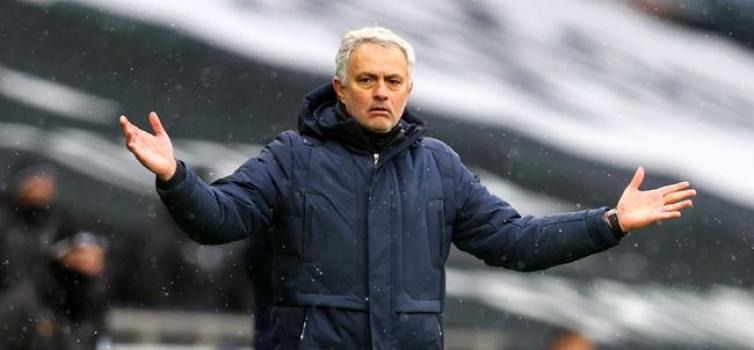Is Mourinho to blame for ageing Tottenham?

Mourinho's Tottenham tenure lasted 17 months
Written by Simon Austin — April 20, 2021
WHEN Jose Mourinho arrived at Tottenham in November 2019, he promised the club were getting a new and improved version of The Special One.
"I have time to think about many things. I realise that during my career I have made mistakes but I won’t make the same mistakes."
This was some show of humility from a manager who has won 25 major trophies during an astonishing career, but Mourinho's spells at Chelsea and Manchester United had ended so badly that they cast a cloud over his reputation.
Despite the promise of change, the Portuguese departed Spurs with his familiar flaws more obvious than ever: an overly pragmatic style of play, a seemingly outdated mode of man-management and a refusal to give young players sustained opportunities.
If we look specifically at this latter point, the stats seem damning. Tottenham have the fourth oldest average starting line-up in the Premier League this season (27.5), behind only West Ham, Burnley and Crystal Palace, and are one of only three teams (along with Palace and Fulham) to have failed to field a single player under the age of 21.
The numbers look even worse when compared to predecessor Mauricio Pochettino's first season, 2014/15. Back then the average age of Tottenham's starting line-up was 25; 8.1% of their minutes went to under-21s; and Harry Kane and Eric Dier, both 21, were establishing themselves as mainstays of the side.
Mourinho did give three league debuts to homegrown players during his Tottenham tenure, but, of these, only Japhet Tanganga was given a sustained opportunity. Even he has played only 11 games this season, held back by injury and the selection choices of his manager.
Of the others, Dane Scarlett was never to be seen again after playing a couple of stoppage-time minutes in February and Troy Parrott was sent out on loan to Millwall and then Ipswich after two appearances for Spurs.
Delve deeper into the stats however, provided for us by the CIES Football Observatory, and you can see that there is the pattern of an ageing squad over several seasons and that the blame can't all be laid at Mourinho's door.
Much of this was by design, with Pochettino making a cadre of young players - Dier, Kane, Dele Alli and Harry Winks - the core of his side.

Source: CIES Football Observatory
But towards the end of his time at Spurs, the Argentine was acutely aware that his squad needed refreshing, which became a major source of frustration and then friction with chairman Daniel Levy.
In consecutive windows - the summer of 2018 and January 2019 - Tottenham failed to sign a single player, while their rivals invested heavily. Mourinho seems to have been chosen as something of a final throw of the dice by chairman Daniel Levy as he tried to get a final song out of an ageing side.
The new manager was backed with 10 signings in last season's 'summer' transfer window, which was delayed by covid, with arrivals including Pierre-Emilie Hojbjerg, Sergio Reguilon, Gareth Bale and Joe Rodon, but none of these were true A-listers, meaning Mourinho continued to rely on the core of the side he'd inherited.

Source: CIES Football Observatory
At a meeting of the Tottenham Supporters Trust last March, Levy admitted that Spurs were still a club that “makes superstars” rather than buying them in.
Yet developing youngsters has never been Mourinho’s skill, nor passion. He’s a manager who wants experienced pros ready to mount an immediate challenge for titles.
The words of former Spurs Sporting Director Damian Comolli last March, that Mourinho was a bad 'culture fit' for the club, proved prescient, but now the onus is back on Levy, to appoint a manager who better fits the DNA of the club and who is capable of refreshing an ageing and seemingly jaded squad.
With the club having spent £1.2bn on a new stadium that has laid empty for a year, and with net debt of £605m as a result, that will not be an easy task.




-1.png)





